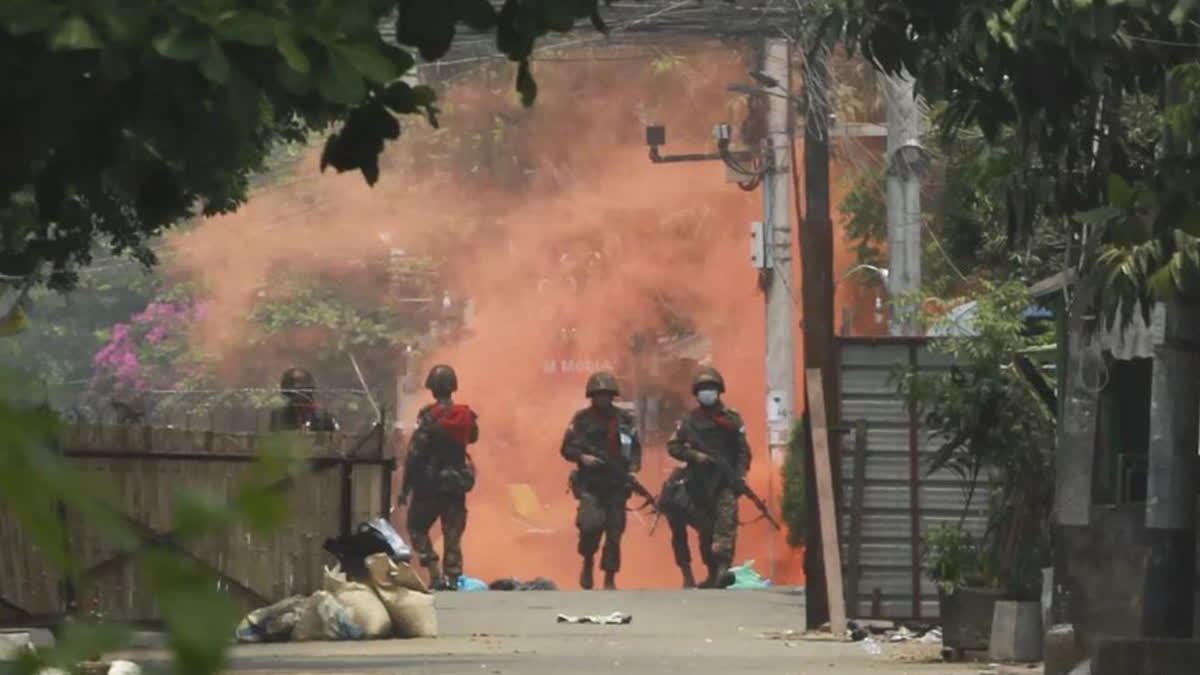New Delhi : Even as the military junta extended the state of emergency in Myanmar by six more months on Wednesday, the regime has eased rules for registration of political parties signaling that elections are likely to be held so that a civilian government can come to power.
The “easing of rules” announcement comes even as junta leader Min Aung Hlaing has come under pressure from all sides to resign in the face of the country’s military facing massive reverses since October last year when resistance forces launched a major offensive. According to a statement issued by the ruling State Administration Council, the number of members a political party should have to register has been brought down to 50,000 from 100,000. At the same time, the number of townships that these parties can operate in has been reduced.
“The wording ‘a total of 90 days’ mentioned in the Sub-Section (f) (of Section 5 of the Political Parties Registration Law) shall be substituted with the wording ‘the day when the Commission issues a notification at least 90 days ahead of the election day’, and the wording ‘at least 100,000 party members’ with the wording ‘at least 50,000 party members’,” the junta statement read.
“The wording ‘a total of 180 days’ mentioned in the Sub-Section (h) shall be substituted with the wording ‘the day when the Commission issues a notification at least 90 days ahead of the election day’ and the wording ‘at least half of all townships’ with the wording ‘at least one-third of all townships’.” However, the nature of the statement without election dates not being announced brings the question whether the whole exercise is a sham.
“The junta wants to demonstrate with this order that it is serious about holding elections and wants the political crisis to end,” K. Yhome, Senior Fellow at the Shillong-based think tank Asian Confluence, told ETV Bharat. “This is the message the junta wants to send to the international community.”
The state of emergency in Myanmar was declared on February 1, 2021, after a military coup deposed democratically elected leader Aung San Suu Kyi. The military cited many irregularities in the 2020 elections in which Suu Kyi’s National League for Democracy (NLD) emerged victorious. After the coup, the military initially said that fresh elections would be held a year later but then said that these will take place in August 2023. However, the junta has been extending the state of emergency every six months, the latest being on Wednesday.
According to observers, the junta’s latest easing of threshold limit of political party membership may be a bid to put up proxy parties for the elections, the dates for which have not been announced yet. Then comes the issue of reduction of the number of townships in which the parties have presence.
Myanmar has experienced widespread violence since the military ousted the democratically elected government of Aung San Suu Kyi in February 2021. However, the junta has been suffering from stunning reverses ever since the Three Brotherhood Alliance launched Operation 1027 in October last year.
The Alliance of the Myanmar National Democratic Alliance Army (MNDAA), Ta’ang National Liberation Army (TNLA) and the Arakan Army (AA) was formed in June 2019. The group rose to prominence in 2023 while resisting the Myanmar junta in the wake of the 2021 Myanmar coup. The groups comprising the Alliance were silent about the coup initially, but released a statement reaffirming the Alliance’s existence in March 2021. During the Myanmar civil war, the group fought mainly in Rakhine State and northern Shan State. On October 27, 2023, the Alliance launched Operation 1027, an offensive against the junta in northern Shan State.
The AA is an ethnic armed organisation based in Rakhine State (Arakan). Founded on April 10, 2009, the AA is the military wing of the United League of Arakan (ULA). The MNDAA is an armed resistance group in the Kokang region. The army has existed since 1989, having been the first one to sign a ceasefire agreement with the then Burmese government. The ceasefire lasted for about two decades.
